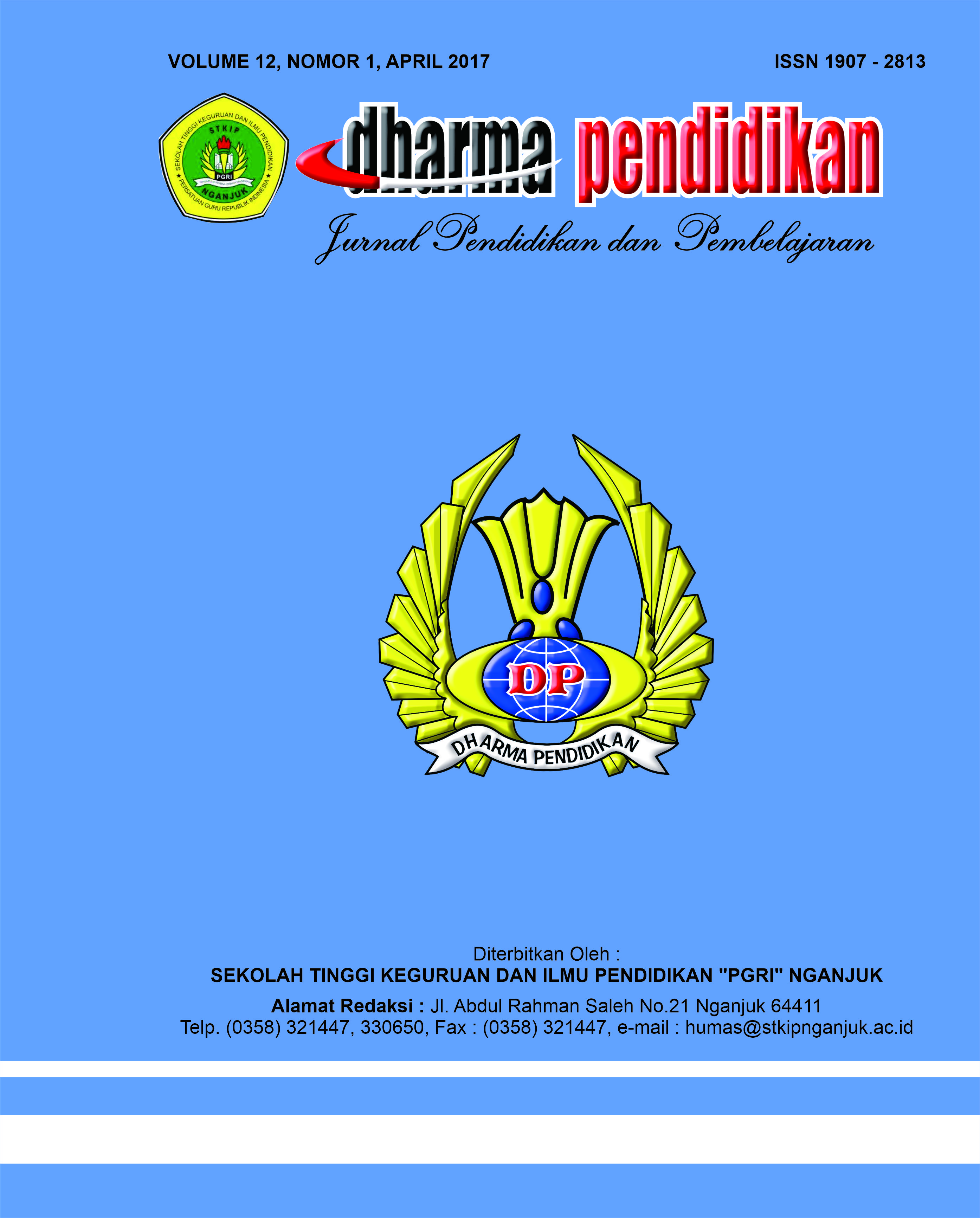Students’ Characters Building In The 2013 English Curriculum And Its Practices In The Classroom: A Case Study
DOI:
https://doi.org/10.69866/dp.v12i1.21Keywords:
Case Study, Characters Building, Teachers’ Perception, the 2013 English CurriculumAbstract
The aim of the study is to identify the teachers’ perception about the students’ characters building in the 2013 English curriculum and its practices in the classroom at the first grade students in a public Senior High School in Nganjuk regency academic year 2016/2017 which have been using the 2013 English curriculum at the first year.This study is a qualitative case study conducted by involving two English teachers and students at the first grade of that school, academic year 2016/2017. Data of this study mainly obtained through some qualitative techniques, such as curriculum documents analysis, interview, observation, questionnaire, and case reports as well, and analyzed by using comparative method of Glaser and Strauss. Finding of the research are: (1) the English teachers’ perceptions about the students’ characters building as their translation of their knowledge in the 2013 English curriculum are same in general, but they still need to have a precise perception toward the C-2013 and mastering its information better; (2) the English teachers implementation of the 2013 English curriculum in developing the students’ good characters in the teaching learning practices in the classroom are: (a) needs some strategies and creativity to make the students enjoy the lesson, (b) scientific approach recommended as an appropriate approach for the students (c) collaboration learning is highly required in the C-2013 classroom. The finding of the research shows that a good perception of the C-2013 strongly influences to the teaching activity to increase characters building for the students. For that reason the English teachers are expected to extend their knowledge of the C-2013 and have a precise perception as the result of a good understanding in C- 2013 to create more effective, joyful, and meaningful teaching learning process as well to maximize the characters’ value for them.
Downloads
References
Bassey, Michael (1999).Case Study Research in Educational Setting. Buckingham. Philadelphia: Open University Press.
Creswell, John W, (1998). Quantitative Inquiry and Research design. Thousand Oaks, CA: SAGE
Departemen Pendidikan dan Kebudayaan Republik Indonesia, 2013. Kurikulum 2013.
Gregory, R. (1974). Concepts and Mechanisms of Perception. London: Duckworth
H.E. Mulyasa,Prof,Dr,M.Pd (2014). Pengembangan dan Implementasi Kurikulum 2013. Bandung: P.T. Remaja Rosdakarya.
Krathwohl R. David (2002). A Revision of Bloom’s Taxomony: An Overview. Theory in Practice, Vol. 41 Numb 4 Autumn 2002 College of Education. Ohio: The Ohio State University.
Kementrian Pendidikan dan Kebudayaan (2014). Materi Pelatihan Guru Implementasi Kurikulum 2013 Tahun Ajaran 2015/2016. Jakarta: Badan Pengembangan Sumber Daya Manusia Pendidikan dan Kebudayaan dan Penjaminan Mutu Pendidikan Kementrian Pendidikan dan Kebudayaan.
Peraturan Pemerintah RI Nomor 19 Tahun 2005 Tentang Standar Nasional Pendidikan, Jakarta: Depdikbud.
Peraturan Pemerintah RI Nomor 32 Tahun 2013 Tentang Perubahan Atas Peraturan Pemerintah Nomor 19 Tahun 2005 Tentang Standar Nasional Pendidikan, Jakarta: Depdikbud.
Permendikbud RI Nomor 54 tahun 2013 Tentang Standar Kompetensi Lulusan Pendidikan Dasar Dan Menengah. Jakarta: Depdikbud.
Permendikbud RI Nomor 64 Tahun 2013 Tentang Standar Isi Pendidikan Dasar Dan Menengah, . Jakarta: Depdikbud.
Permendikbud RI Nomor 65 Tahun 2013 Tentang Standar Proses Pendidikan Dasar Dan Menengah, Jakarta: Depdikbud.
Permendikbud RI Nomor 66 Tahun 2013 Tentang Standar Penilaian Pendidikan, Jakarta: Depdikbud.
Permendikbud RI Nomor 69 Tahun 2013 Tentang Kerangka Dasar dan Struktur Kurikulum Sekolah Menengah Atas/Madrasah Aliyah, Jakarta: Depdikbud.
Permendikbud RI Nomor 81 a tahun 2013 Tentang Implementasi Kurikulum 2013, Jakarta: Depdikbud.
Permendikbud RI Nomor 59 tahun 2014 Tentang Kurikulum 2013 Sekolah Menengah Atas/ Madrasah Aliyah, Jakarta: Depdikbud.
Permendikbud RI Nomor 103 tahun 2014 Tentang Pembelajaran Pada Pendidikan Dasar Dan Pendidikan Menengah, Jakarta: Depdikbud.
Permendikbud RI Nomor 104 tahun 2014 Tentang Penilaian Hasil Belajar Oleh Pendidik, Jakarta: Depdikbud.
Permendikbud RI Nomor 105 tahun 2014 Tentang Pendampingan Pelaksanaan Kurikulum 2013 Pada Pendidikan Dasar Dan Pendidikan Menengah, Jakarta: Depdikbud.
Pendekatan Scientific dalam Implementasi Kurikulum 2013. Retrieved from http://penelitiantindakankelas.blogspot.com/2013/07/pendekatan-scientific-dalam-implementasi- kurikulum-2013.html, 5 November 2013
Downloads
Published
How to Cite
Issue
Section
License
Copyright (c) 2021 Endang Warniati

This work is licensed under a Creative Commons Attribution-ShareAlike 4.0 International License.
1. Hak cipta atas artikel apa pun dipegang oleh penulisnya.
2. Penulis memberikan jurnal, hak publikasi pertama dengan karya yang dilisensikan secara bersamaan di bawah Lisensi Atribusi Creative Commons yang memungkinkan orang lain untuk membagikan karya dengan pengakuan atas kepenulisan dan publikasi awal karya tersebut dalam jurnal ini.
3. Penulis dapat membuat pengaturan kontrak tambahan yang terpisah untuk distribusi non-eksklusif dari versi jurnal yang diterbitkan dari karya tersebut (misalnya, mempostingnya ke repositori institusional atau menerbitkannya dalam sebuah buku), dengan pengakuan dari publikasi awalnya di jurnal ini.
4. Penulis diizinkan dan didorong untuk memposting karya mereka secara online (misalnya, di repositori institusional atau di situs web mereka) sebelum dan selama proses pengiriman, karena hal itu dapat mengarah pada pertukaran yang produktif, serta kutipan yang lebih awal dan lebih besar dari karya yang diterbitkan.
5. Artikel dan materi terkait yang diterbitkan didistribusikan di bawah Lisensi Internasional Creative Commons Attribution-ShareAlike 4.0









.png)




